The Best Convenience Store POS Systems
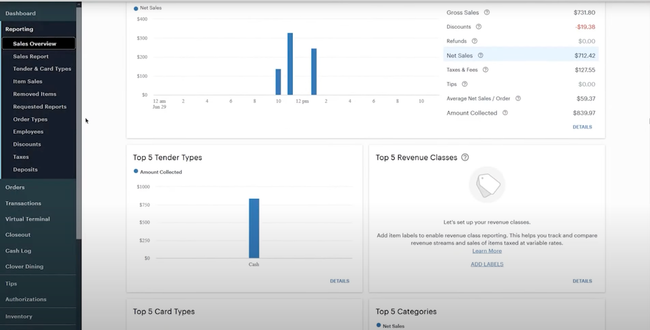
- Accepts EMV chip cards, magnetic swipe cards, NFC payments
- Syncs directly with accounting software like QuickBooks
- Add-ons available through Clover App Market
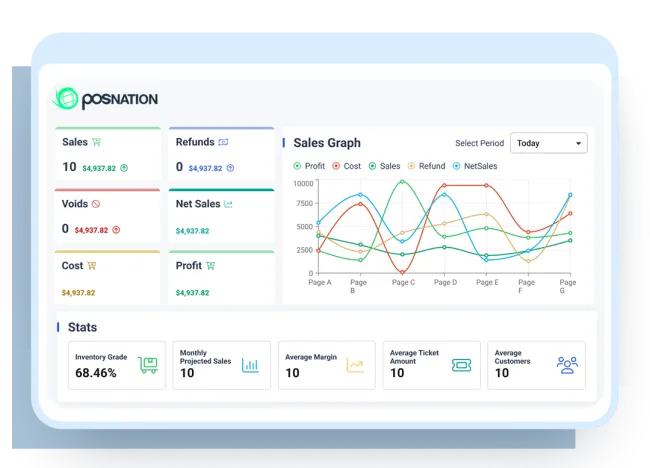
- One system to keep everything together
- Assigned Customer Success Manager
- Includes scheduling and inventory
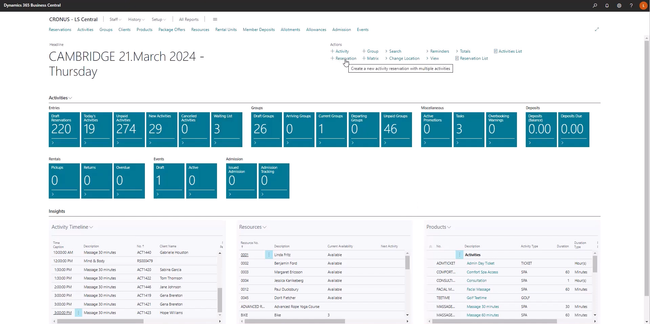
- Extends Microsoft Dynamics 365 Business Central
- Gives the client full control over business operations
- Includes customer loyalty mobile app
After researching and comparing the best convenience store POS systems on the market using our independent review process, here are our top picks.
- Clover: Best Overall
- POS Nation: Runner-Up
- LS Central by LS Retail: Top Pick
- Square: Best for Payment Processing
- Lightspeed POS: Best for Cloud
- KORONA: Best Value
1 Clover - Best Overall
Why We Chose It: Clover is our top pick for convenience store POS systems because it offers flexibility and customization. Its compatibility with various mobile devices and tablets makes it versatile and adaptable to different store setups. Clover provides a range of hardware options, including tablets, credit card scanners, and more, which can be bundled with their POS software, making it a one-stop solution for businesses.
With capabilities such as point of sale, reporting, employee management, online ordering, and financial solutions, it covers all essential aspects of running a convenience store efficiently. Additionally, it supports various payment methods, including EMV chip cards, magnetic swipe cards, and NFC payments, ensuring that customers have multiple payment options.
2 POS Nation - Runner-Up
Why We Chose It: POS Nation encompasses a wide range of features that are particularly relevant to convenience stores, including barcode scanning, inventory management, and lottery ticket sales. Users can even customize hotkeys for quick transactions, and a dual pricing option that allows merchants to manage credit card costs effectively.
POS Nation has an extra focus on security and loss prevention, which is crucial for convenience stores. The system can help detect instances of shoplifting and employee theft, as well as provide alerts for low inventory levels, blending overall security and inventory control.
3 LS Central by LS Retail - Top Pick
Why We Chose It: LS Central by LS Retail is a top pick thanks to its integration with Microsoft Dynamics 365 Business Central. This connection allows stores businesses to have complete control over their operations, from accounting and reporting to store management and POS within a single, centralized database.
LS Retail offers users customizable POS capabilities, loyalty program management, and tools for loss prevention. There’s also a customer loyalty mobile app, so shops can engage and reward their returning customers.
4 Square - Best for Payment Processing
Why We Chose It: Square is a payment processing software which includes a POS system, making an all-in-one solution for convenience stores. Through a variety of card readers and credit card processing options, businesses can easily accept in-store and eCommerce payments based on the preference of customers.
Square’s transparent pricing structure, with no setup fees and transaction fees of 2.6% + 10c per transaction, makes it budget-friendly for small businesses. This POS also offers various hardware options, including readers, stands, and registers, allowing businesses to choose the setup that best suits their needs. Finally, Square’s API integrations and prebuilt partner apps in the Square App Marketplace make it adaptable to the specific requirements of convenience stores.
5 Lightspeed POS - Best for Cloud
Why We Chose It: Lightspeed POS, once known as ShopKeep, is another popular solution for convenience stores. With its cloud-based platform running on iOS, Android or desktop, Lightspeed POS provides convenience store owners with an easy-to-use, secure, and supportive POS system. It also offers contract-free payment processing and a dedicated 24/7 customer support team, ensuring convenience stores have reliable assistance whenever needed.
The main features include inventory management, employee management, and customer tracking capabilities, making it well-suited for the specific business needs of convenience stores.
6 KORONA - Best Value
Why We Chose It: KORONA is a cloud-based POS software with a versatile feature set, customizability, and subscription-based pricing. A suitable fit for small to enterprise-level convenience stores, KORONA provides convenience store owners with not only software but fully configured hardware, such as desktops, tablets, credit card machines, receipt printers, and scanners. The out-of-the-box setup simplifies the onboarding process to provide users with a seamless transition to the new system.
The subscription-based pricing model, with no contracts, fees, or surcharges, is a budget-friendly option for store owners. Premium add-ons allow for scalability as the business grows. KORONA’s customer support and in-house product specialists are available during business hours and 24/7 for emergencies to help owners receive the assistance they need at all times.
What is a Convenience Store POS System?
Convenience store point of sale systems help small business owners manage store operations with features like payment processing, inventory management, and reporting. Any retail POS system should streamline your back office operations, allowing you to issue refunds, conduct inventory control, and even handle customer relationship management (CRM).
Many convenience store owners require retail point of sale systems which blend the operational requirements of liquor stores and grocery stores. For instance, you’ll need to have age verification functionality at checkout for restricted alcohol, tobacco, and lottery ticket sales. POS software makes it easier to streamline these disparate business processes into a single user-friendly solution. And c-stores with gas stations need to consider solutions with specialized add-ons like integrated pump control and pay-at-the-pump.
Features of Convenience Store POS Systems
Popular modules usually included in convenience store point of sale systems include:
- Payment processing
- Inventory management
- Customer relationship management
- Employee management
- Reporting and analytics
Payment Processing
Convenience store POS systems allow you to process payments from any method including check, credit cards, EBT, and gift cards. The Payment Card Industry Data Security Standard (PCI DSS) encourages businesses to integrate POS solutions with EMV chip card readers to reduce fraud risk. If your card reader is not EMV compliant, it’ll be your store that loses money for fraudulent transactions, not the bank or financial institution. Newer convenience store point of sale software will allow EMV transactions.
When choosing payment processors, keep in mind the POS hardware requirements vendors might have. Most solutions integrate with existing hardware like credit card terminals and cash drawers. And remember to look for low processing fees when making your selection.
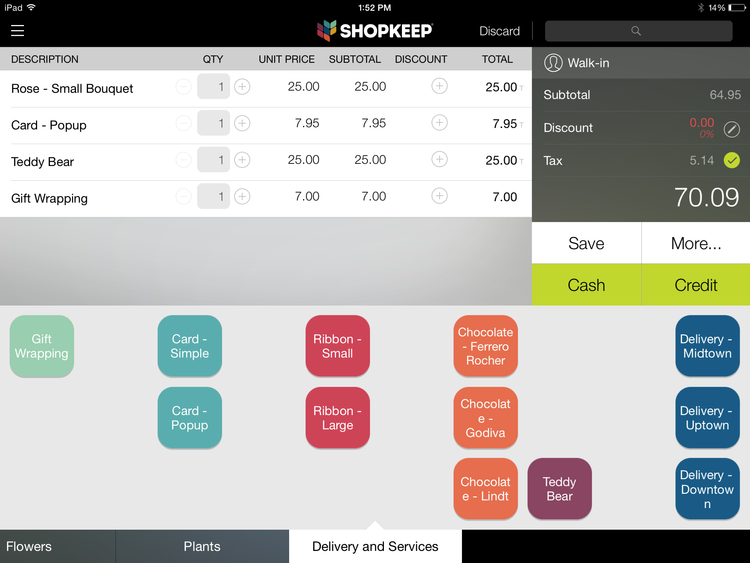
Inventory Management
POS systems automatically update your inventory counts when an item is sold, whether you have a physical location or online store. When your inventory starts running low, the system will notify you to reorder more. The system can also automatically create purchase orders when inventory levels reach a certain threshold.
Some POS software vendors sell handheld barcode scanners and label printers to assist with inventory tracking and finding price information.
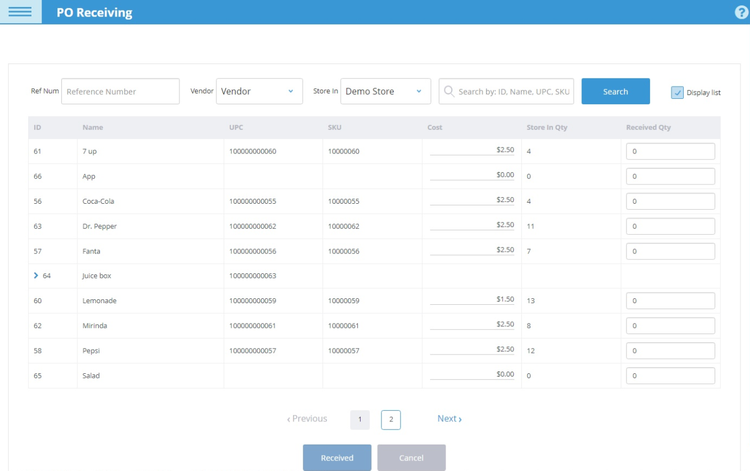
Customer Relationship Management (CRM)
A convenience store point of sale system needs to confirm customers are the right age for restricted purchases like alcohol, tobacco, or lottery tickets. Software automatically prompts cashiers to scan an ID or enter a date of birth to prevent minors from buying these items. POS systems can be localized to ensure you’re meeting local and state laws for restricted sales, like denying sales based on the time or day of the week.
Convenience store POS systems also integrate with loyalty programs to incentivize customers to keep coming back. Customer loyalty programs can be customized to offer free items or a discount on products with a set number of purchases. Information from the loyalty program is kept within a database to store contact information, email addresses, and purchase history for targeted marketing campaigns. And there are ways to provide customer support when necessary.
Employee Management
The best convenience store POS systems assist with staff management. Time tracking functionality allows employees to clock in and out, ensuring they’re at work on-time and not skipping shifts. The system will also allow you to look into an employee’s performance and compare sales data with money in the cash register to prevent theft. User permissions can be set so only certain employees like store managers can void items or authorize discounts.
Reporting
Reporting functionality in convenience store POS systems provide real-time sales reports to help you evaluate your revenue to make better business decisions and improve your profit margins. For example, being able to see what items are bringing in the most ROI can help you plan the store layout. You can then place top-performing products in eye-catching spots to increase impulse buys.
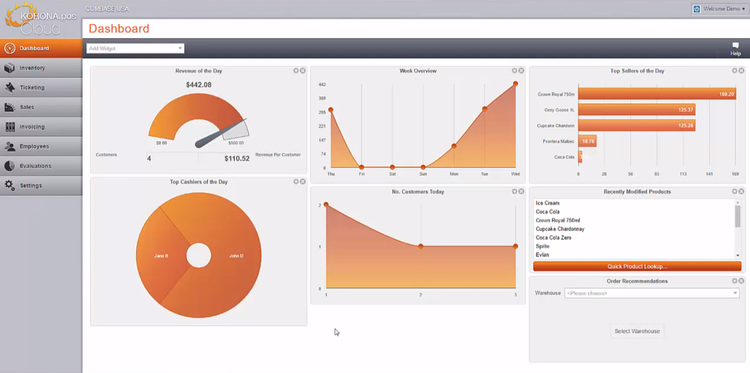
Gas Station POS Systems
Convenience stores with gas stations need a point of sale solution with fuel management capabilities to monitor contactless sales, control pump operations and automatically adjust pricing as gas prices fluctuate. Gas station POS systems allow customers to pay at the pump with debit or credit cards with a card reader or opt to pay inside. A receipt printer integrated with the POS system will allow customers to get their receipt right at the pump, entirely contactless. Customers can also pay for additional items alongside their fuel at the cash register.
POS solutions tailored to gas stations allow you to control the fuel pump from the system. When customers prepay for a certain amount of gas, the pump will automatically shut off when it reaches the preset limit. In case of emergency, the pump can be shut off remotely through the POS system. Your POS software will also automatically shut the pump off when tank gauge readings reach a certain level to prevent customers from overfilling their vehicles.
Convenience Store POS System Pricing
Convenience store POS software pricing varies depending on several factors, mostly total users, integration options, and implementation preferences. Some stores need a complete system of both software and hardware. Monthly fees for SaaS plans begin at $29 per month while others are up to $1,600 per month. One-time perpetual license fees average about $2,000 which includes ongoing support.
Mobile apps for smartphones and tablets might be included with the cost or for an additional fee. For example, being able to swipe credit cards with an Apple iPad or Android device can expedite checkout processes during busy times. Some software can also integrate with popular accounting solutions such as QuickBooks.



























